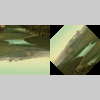register_image_conversion()#
Register new image conversion functionality to be used by convert_image().
Examples#

import numpy as np
from PIL import Image
def pillow_image_to_ndarray_precondition(obj):
return isinstance(obj, Image.Image)
# convert rotated PIL Images to NumpyImageArray objects
# (py5 will convert a NumpyImageArray object to a Py5Image object)
def pillow_image_to_ndarray_converter(img, **kwargs):
rotate = kwargs.get('rotate', 180)
if img.mode not in ["RGB", "RGBA"]:
img = img.convert(mode="RGB")
img = img.rotate(rotate)
return py5.NumpyImageArray(np.asarray(img), img.mode)
py5.register_image_conversion(
pillow_image_to_ndarray_precondition, pillow_image_to_ndarray_converter
)
def setup():
pil_img = Image.open('data/rockies.jpg').reduce(2)
img1 = py5.convert_image(pil_img)
img2 = py5.convert_image(pil_img, rotate=45)
py5.image(img1, 0, 25)
py5.image(img2, 50, 25)
Description#
Register new image conversion functionality to be used by convert_image(). This will allow users to extend py5’s capabilities and compatability within the Python ecosystem.
The precondition parameter must be a function that accepts an object as a parameter and returns True if and only if the convert_function can successfully convert the object.
The convert_function parameter must be a function that accepts an object as a parameter and returns either a filename that can be read by load_image(), a py5.NumpyImageArray object, or a Py5Image object. View py5’s source code for detailed information about py5.NumpyImageArray objects. The convert_function will take care of loading an image from a returned image filename or converting the py5.NumpyImageArray object into a Py5Image object.
Signatures#
register_image_conversion(
precondition: Callable, # predicate determining if an object can be converted
convert_function: Callable, # function to convert object to relevant image data
) -> None
Updated on December 11, 2023 16:58:45pm UTC
